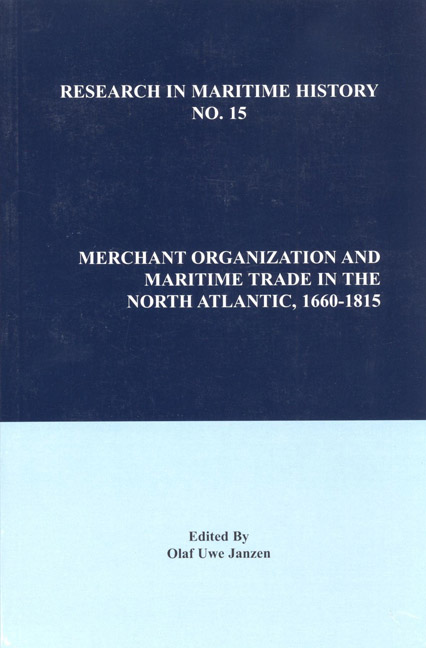Book contents
- Frontmatter
- Contents
- Contributors
- Preface
- CONTRIBUTIONS
- “Introduction”
- “The Gaigneur Clan in the Seventeenth-Century Canada Trade”
- “Credit, Risk and Reputation in Late Seventeenth- Century Colonial Trade”
- “The Huguenot Diaspora and the Development of the Atlantic Economy: Huguenots and the Growth of the South Carolina Economy, 1680-1775”
- “Breaching the Mercantile Barriers of the Dutch Colonial Empire: North American Trade with Surinam during the Eighteenth Century”
- “A Scottish Venture in the Newfoundland Fish Trade, 1726-1727”
- “The Consolidation of Bilbao as a Trade Centre in the Second Half of the Seventeenth Century”
- “Cutting Out The Middleman? American Trade In Northern Europe, 1783-1815”
- “A Vital Link in Wartime: The Organization of a Trade and Shipping Network Between the United States and Bordeaux, 1793-1815”
- “The Challenge of War on Maritime Trade in the North Atlantic: The Case of the British Trade to Iceland During the Napoleonic Wars”
“Credit, Risk and Reputation in Late Seventeenth- Century Colonial Trade”
from CONTRIBUTIONS
- Frontmatter
- Contents
- Contributors
- Preface
- CONTRIBUTIONS
- “Introduction”
- “The Gaigneur Clan in the Seventeenth-Century Canada Trade”
- “Credit, Risk and Reputation in Late Seventeenth- Century Colonial Trade”
- “The Huguenot Diaspora and the Development of the Atlantic Economy: Huguenots and the Growth of the South Carolina Economy, 1680-1775”
- “Breaching the Mercantile Barriers of the Dutch Colonial Empire: North American Trade with Surinam during the Eighteenth Century”
- “A Scottish Venture in the Newfoundland Fish Trade, 1726-1727”
- “The Consolidation of Bilbao as a Trade Centre in the Second Half of the Seventeenth Century”
- “Cutting Out The Middleman? American Trade In Northern Europe, 1783-1815”
- “A Vital Link in Wartime: The Organization of a Trade and Shipping Network Between the United States and Bordeaux, 1793-1815”
- “The Challenge of War on Maritime Trade in the North Atlantic: The Case of the British Trade to Iceland During the Napoleonic Wars”
Summary
“Credit is the value raised by opinion,” observed Nicholas Barbon, “it buys goods as money does; and in all trading cities there's more wares sold upon credit than for present money.” Credit in the sense of belief, confidence, faith, trust, the estimate in which a character is held, reputation, was the elusive but fundamental key to success in early modern commerce. A brief look at the intricate workings of seventeenth-century colonial trade, the nature of the risks involved, and the role of reputation in risk reduction strategies show the overwhelming importance of “credit” and suggest ways in which it shaped the structure of the enterprise.
England's colonial trade was well established by 1660, by which time its people had settled permanent plantations on the American mainland in the Chesapeake and New England and, in the Caribbean, in St. Christophers, Barbados, Nevis, Antigua, Montserrat and (as yet precariously) in Jamaica which had been seized from the Spaniards in 1655. The southern plantations produced valuable cash crops for exchange including tobacco, sugar, indigo, ginger, cotton, and dyewoods; New Englanders provided fish, timber, ships, and shipping services to the southerners; the mother country provided the colonists with manufactured goods, food, and labour (first white but, increasingly, black slaves taken in Africa). In the period down to the Glorious Revolution in 1688 England consolidated and extended settlement in the middle colonies and the lower south and, with the aid of the Navigation Acts streamlined after the Restoration, ensured that an increasing share of the expanding commerce remained in its hands, concentrated on London which emerged as the hub of the system. The precarious figures which survive suggest that the value of London's imports from the colonies more than doubled between the 1660s and the end of the century, with similar growth in exports (table 1). Colonial trade accounted for about twenty percent of London's overseas trade but, on account of the long distances involved, a far higher proportion of the shipping and related services. Trade was particularly buoyant in the peace years between 1674 and 1689 with a reported peak in 1686 and many of the figures given here are taken from a computerized survey of the port books for that year.
- Type
- Chapter
- Information
- Publisher: Liverpool University PressPrint publication year: 2017



